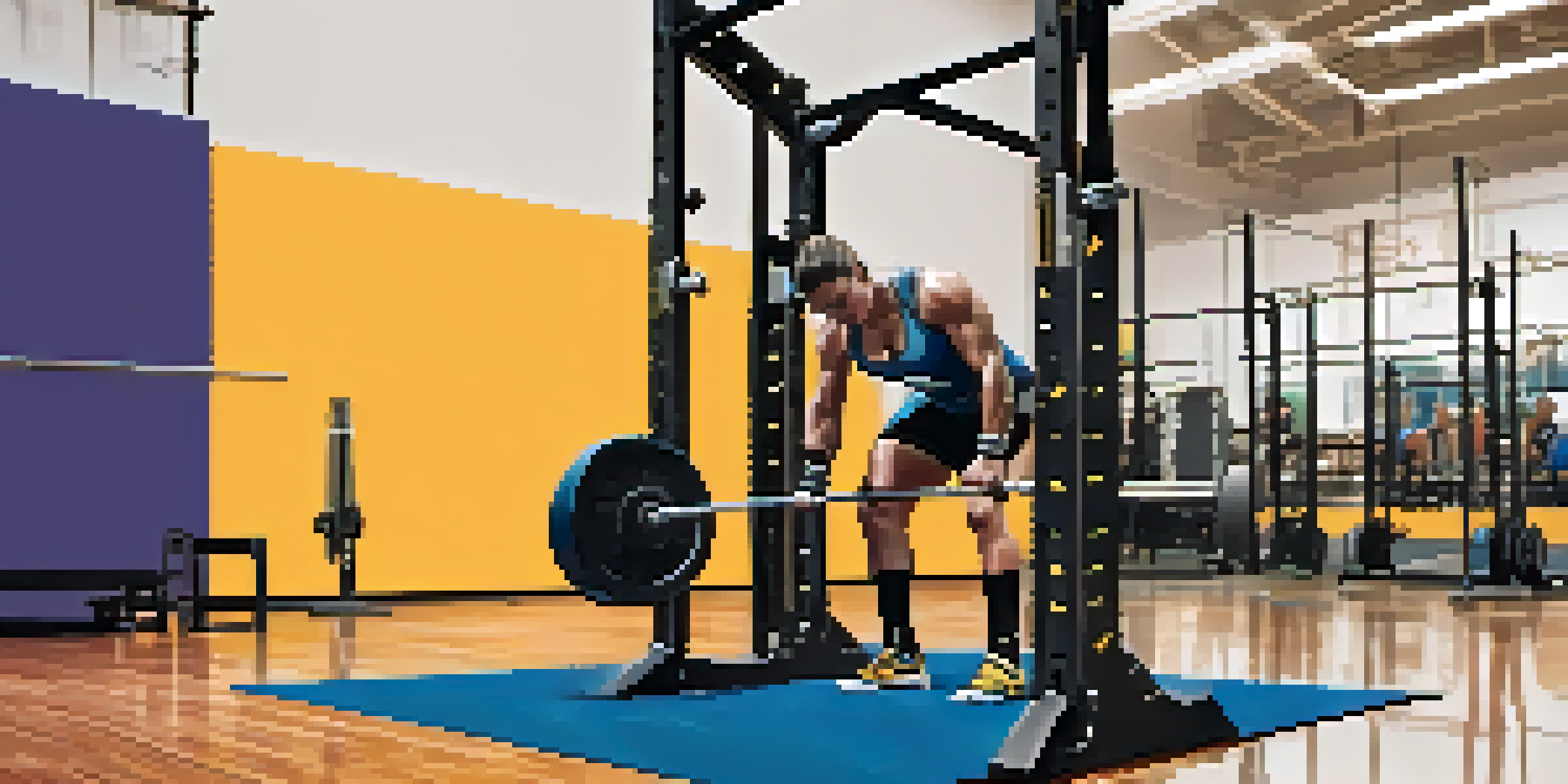The Importance of Weigh-Ins Before Powerlifting Meets

Understanding the Weigh-In Process in Powerlifting
Weigh-ins are a critical part of any powerlifting meet, acting as a gatekeeper to ensure competitors fall within their designated weight classes. Typically conducted 24 hours before the competition, this process helps set the stage for the lifters' performance. It's a time when athletes get to assess not just their weight, but also their readiness for the competition ahead.
Success is where preparation and opportunity meet.
During weigh-ins, athletes step onto the scale, and the results determine which weight class they will compete in. This can be a nerve-wracking experience, as even a slight fluctuation in weight can impact the category they are placed in. Understanding this process can help lifters feel more at ease, knowing that they have prepared adequately for this crucial moment.
Ultimately, weigh-ins serve as both a physical and mental checkpoint for powerlifters. They are an opportunity to reflect on training, nutrition, and strategy. Athletes can take this time to mentally prepare for the challenges that lie ahead in the competition.
The Role of Weight Classes in Powerlifting
Weight classes are fundamental in powerlifting, ensuring fair competition among athletes of similar body weight. By categorizing lifters, the sport emphasizes strength relative to body size, making it more competitive and exciting. For many athletes, choosing the right class can significantly impact their chances of success at the meet.

Competing in a weight class that aligns with an athlete's training and body composition can lead to better performance outcomes. Lifters must be strategic about their weight management to stay within their desired category without sacrificing strength. This balancing act can often define the difference between a good and great performance.
Importance of Weigh-Ins
Weigh-ins are crucial for setting the stage for competition, impacting both physical readiness and mental preparation.
It’s essential for athletes to understand the weight classes and how they work, as this knowledge can influence their approach to training and nutrition. A well-timed weigh-in can enable lifters to optimize their strength and readiness, maximizing their potential on the competition day.
Impact of Weigh-Ins on Performance Strategy
Weigh-ins can have a significant psychological impact on an athlete's mindset and performance during the competition. Knowing their weight allows lifters to strategize their lifts accordingly, aiming for personal bests while also considering their competitors. This mental preparation can set the tone for how they approach the day of the meet.
The mind is everything. What you think you become.
For instance, a lifter who successfully manages their weight and feels confident during weigh-ins is often more focused and relaxed during their lifts. This can lead to better technique and stronger performances. Conversely, those who struggle with weight management may find themselves anxious, which can negatively affect their lifting mindset.
Thus, weigh-ins are about more than just numbers on a scale; they are also a crucial element of the mental game in powerlifting. Athletes must learn to embrace this aspect of competition, understanding that a positive mindset can be just as important as physical preparation.
Nutritional Considerations Before Weigh-Ins
Nutrition plays a pivotal role leading up to weigh-ins, and athletes must carefully plan their meals to ensure they hit their weight class. Many lifters experiment with different diets and timing strategies to find what works best for them. This careful planning can make a significant difference in how they feel on competition day.
A common approach is to gradually reduce water intake and adjust food consumption in the days leading up to the weigh-in. However, this must be done with caution to avoid negatively impacting strength and energy levels. A well-thought-out nutrition plan can help lifters maintain their strength while still making weight.
Nutrition and Hydration Strategies
Proper nutrition and hydration management before and after weigh-ins can significantly enhance an athlete's performance.
Ultimately, understanding the relationship between nutrition and weigh-ins empowers athletes to make informed decisions. By prioritizing their dietary choices, they can enhance their performance while staying within their weight class, striking a balance that is crucial for success.
The Importance of Hydration Leading Up to Weigh-Ins
Hydration is another critical factor to consider before weigh-ins, as it directly impacts body weight and performance. Athletes often face the challenge of balancing hydration levels while trying to make weight. This is especially true for those who compete in lighter weight classes, where every ounce counts.
In the days leading up to the competition, many lifters will adjust their fluid intake to help manage their weight. However, it's vital to navigate this carefully to avoid dehydration, which can severely impact performance. Staying hydrated not only supports bodily functions but also helps maintain strength and focus during lifts.
Ultimately, a strategic approach to hydration can enhance an athlete's performance while allowing them to meet their weight goals. Lifters who understand their body's needs in relation to hydration can set themselves up for success both on the scale and on the platform.
Mental Preparation for Weigh-Ins and Competitions
Mental preparation is just as crucial as physical training when it comes to weigh-ins and overall competition performance. Athletes often face anxiety and pressure leading up to the scale, and learning to manage these feelings can significantly influence their results. Techniques such as visualization and positive affirmations can help calm nerves and build confidence.
Developing a pre-weigh-in routine can also be beneficial, allowing lifters to create a sense of normalcy and control. Whether it’s listening to music, practicing breathing exercises, or reminding themselves of their training, finding what works can help ease pre-competition jitters. This mental preparation can be the difference between feeling overwhelmed and feeling empowered.
Mental Preparation Matters
Focusing on mental preparation techniques can help athletes manage anxiety and improve their competition experience.
By prioritizing mental health and preparation, athletes can approach weigh-ins with a clear head and a strong focus. This not only aids in their overall performance but also contributes to a more enjoyable competition experience.
Post-Weigh-In Strategies for Optimal Performance
After weigh-ins, the focus shifts to recovery and preparation for the actual competition. Athletes need to refuel properly to replenish energy stores and ensure they are ready to lift their best. This is where understanding nutrition and hydration becomes essential, as lifters must make smart choices in a short time frame.
Many lifters will consume a combination of carbohydrates, proteins, and fluids immediately after weighing in to help restore energy. Timing is crucial here, as they want to ensure they feel strong and ready when it's time to compete. Additionally, some may use this opportunity to mentally visualize their lifts, reinforcing their confidence.

Ultimately, how athletes manage their time after weigh-ins can significantly influence their performance on the platform. A well-planned post-weigh-in strategy allows lifters to maximize their potential and achieve their goals, making all the effort leading up to the meet worthwhile.